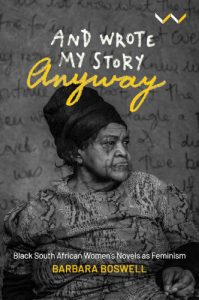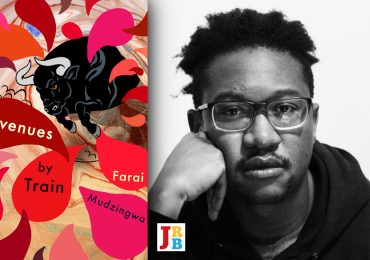The JRB presents an excerpt from the Author’s Preface of And Wrote My Story Anyway: Black South African Women’s Novels as Feminism, the new book by Barbara Boswell, which will be published on 1 September 2020.

And Wrote My Story Anyway: Black South African Women’s Novels as Feminism
Barbara Boswell
Wits University Press, 2020
In her new book, Barbara Boswell focuses on the work of ten well known writers, spanning both the apartheid and post-apartheid era: Miriam Tlali, Lauretta Ngcobo, Farida Karodia, Agnes Sam, Sindiwe Magona, Zoë Wicomb, Rayda Jacobs, Yvette Christiansë, Kagiso Lesego Molope and Zukiswa Wanner.
In her Preface, Boswell reveals how Bessie Head’s writing opened up for her a new future.
‘Head clearly saw the role of the writer—and her role specifically—as aiding the struggle of Africans to interrogate and discard oppressive ideologies,’ Boswell writes. ‘Creative articulation was the gift Head honed in order to achieve this aim; she consciously left a legacy and a model for artistic production which, through her unshakable faith, ‘found’ others, in an unknown future, who needed such instruction. This is instruction I take gladly. In this book, I use it as a guide in examining the work of Head’s imagined literary heirs—the women writers for whom, I believe, she blazed a trail into the future.’
Read the excerpt from the Preface here:
~~~
Author’s Preface
‘I forcefully created for myself, under extremely hostile conditions, my ideal life. I took an obscure and almost unknown village in the Southern African bush and made it my own hallowed ground … My work was always tentative because it was always so completely new: it created new worlds out of nothing.’
—Bessie Head, A Woman Alone: Autobiographical Writings
‘I have always reserved a special category for myself, as a writer—that of pioneer blazing a new trail into the future.’
—Bessie Head, A Woman Alone: Autobiographical Writings
Imagine one possibility of this future Bessie Head conjures. It is 1994. A young woman, me—designated ‘coloured’ by apartheid law, and about to come of age in the new, democratic South Africa, working as a trainee journalist at an alternative newspaper in Cape Town. I’m assigned a work of fiction to review, The Cardinals, with Meditations and Short Stories, by a writer unfamiliar to me, Bessie Head. Extremely conscious of her agency as a writer, and wishing to leave a legacy, Head had been writing into a future she could neither have predicted nor anticipated. Yet our meeting on the page was an encounter she must have foreseen; writing, as she did, across time and space. Meeting her like this knocked my world off its axis.
As a child who’d grown up during the last decade of formal apartheid, I’d received an education in accordance with my designated place in South Africa’s racial hierarchy. An avid reader, my literary diet had consisted of books borrowed from a government library, and literature prescribed by apartheid bureaucrats for language instruction in school. Black writers of any gender were excluded from these works, since most of them, and their work, had been banned.
The political changes in South Africa leading to the first democratic election in 1994 unleashed a flood of previously banned literature. It was at this moment that I became acquainted with Head’s first novella, The Cardinals, written in the early nineteen-sixties and published posthumously in 1993. It was her only published work of fiction set and written in Cape Town, before she was ‘endorsed out’ of South Africa in 1964 on an exit permit that would exile her to Botswana for the rest of her life, prohibiting her return to the land of her birth.
The experience of reading Head’s work was profoundly unsettling. Try as I might, I was unable to produce the required book review for my newspaper’s art pages. Head’s writing confounded me in two ways: this was the first time I’d experienced the city where I was born and had lived in on the pages of a work of fiction. In The Cardinals, Head had vibrantly and intimately rendered the place that I loved, my home city. She had written a love letter to a place I was about to inhabit, for the first time, as an autonomous, liberated citizen. As a black girl who had been prohibited by apartheid law throughout my life from entering certain public spaces in Cape Town, I was acutely aware of how space was opening up to me. I went everywhere I could, determined to experience everything the city had to offer. The place she had sketched in her novella some thirty years prior, was the same living, breathing city I was now exploring daily.
The experience of having my world depicted in this way was, at the time, alien. Until then, the worlds I had entered through fiction had always existed elsewhere. While I enjoyed being transported to foreign places, it had never occurred to me that my own world could be the subject or setting for fiction. The literature I’d previously read had always centred some other place, elsewhere, or the subjectivity of someone who didn’t look like me. Discovering my home town, in all its beauty and ugliness, as a central character in a work of fiction drew me into the text in a completely new way. Here was a new space—the discursive—opening up to me, which I explored with as much zest as the physical geography of the city.
The Cardinals intrigued and mystified me on another level, too. Its main character, Mouse, was a young black woman who had just started working as a journalist. She wrote fiction in her spare time, and the novella was a kunstlerroman [artist’s novel] illuminating Mouse’s internal struggles as she mastered the art of writing. Unsure of her talent and unsure of her voice or whether she even had anything to say, she nevertheless carried on writing. As a fledgling writer myself, I connected deeply with this character. Though acutely aware of my power to represent people in the way ‘news’ was constructed, I was simultaneously afraid of this power. The character’s struggles with finding her voice thus resonated deeply on a personal as well as political level. Never before had I encountered the subjectivity of a young coloured woman at the centre of a novel. The message I had received through twenty years of fiction reading was that the interiority of a young black woman embedded within apartheid’s social relations was simply not a subject worthy of literature.
Head’s work jolted me awake, I realised, because I had not thought it possible that a black woman could be a writer. My education and socialisation had led me to believe that producing art—the production of a beautiful object, for no reason other than the pleasure of creating—was an activity that I, or someone like me, should not consider a possibility. Reading The Cardinals crystallised for me the fact that a black woman who had lived under apartheid, in similar conditions to mine, had succeeded in carving out a creative life—a fact that, until then, had not been a possibility I’d been remotely aware of.
What Head had ‘forcefully created’ (A Woman Alone, 28) through her writing was not only her ‘own hallowed ground’, but also a space into which I could enter, dream different dreams, and imagine myself as a creative being. In ‘creat[ing] new worlds out of nothing’ (28), Head also re-made the world for me, conjuring a host of new possibilities. I have been guided by these possibilities in writing this book.
~~~
- Barbara Boswell is a feminist literary scholar and Associate Professor of English at the University of Cape Town. She is the author of Grace: A Novel (2017), which won the 2018 University of Johannesburg Debut Prize for Creative Writing.
About the book
‘What becomes possible in fiction by Black South African women? In this study, Barbara Boswell brilliantly reads novels by Miriam Tlali, Zoë Wicomb, Zukiswa Wanner, Kagiso Molope and others, and threads them into a transnational feminist literary conversation in which South African writing takes its rightful place. The result is a necessary and illuminating study which will become required reading in Literature and Women’s Studies classes across the globe. I read it hungrily and with gratitude.’
— Gabeba Badaroon, poet and Associate Professor, Women’s, Gender and Sexuality Studies and African Studies, Pennsylvania State University
‘In And Wrote My Story Anyway Barbara Boswell offers a passionate, often intensely personal, always persuasive engagement with an important genealogy of Black South African women writers, extending from Miriam Tlali and Lauretta Ngcobo to Zukiswa Wanner and Kagiso Molope. Taking her inspiration from Bessie Head’s declaration that writing opens spaces of resistance and recovery, Boswell’s series of paired readings demonstrate the writers’ powerful contributions to discourses of family, race and nation, and their reframing of female subjectivity. And Wrote My Story Anyway draws their work decisively out of the critical shadows.’
— Elleke Boehmer, Professor of World Literature in English, Oxford University
Part literary history, part feminist historiography And Wrote My Story Anyway: Black South African Women’s Novels as Feminism critically examines influential novels in English by eminent black female writers.
Studying these writers’ key engagements with nationalism, race and gender during apartheid and the transition to democracy, Barbara
Boswell traces the ways in which black women’s fiction critically interrogates narrow ideas of nationalism. She examines who is included and excluded, while producing alternative visions for a more just South African society.
This is an erudite analysis of ten well known writers, spanning both the apartheid and post-apartheid era: Miriam Tlali, Lauretta Ngcobo, Farida Karodia, Agnes Sam, Sindiwe Magona, Zoë Wicomb, Rayda Jacobs, Yvette Christiansë, Kagiso Lesego Molope and Zukiswa Wanner. Boswell argues that black women’s fiction could and should be read as a subversive site of knowledge production in a setting which, for centuries, denied black women’s voices and intellects.
Reading their fiction as theory, for the first time these writers’ works are placed in sustained conversation with each other, producing an arc of feminist criticism that speaks forcefully back to the abuse of a racist, white-dominated, patriarchal power.






One thought on “‘Bessie Head’s work jolted me awake … I had not thought it possible that a black woman could be a writer’—Read an excerpt from Barbara Boswell’s new book, And Wrote My Story Anyway”